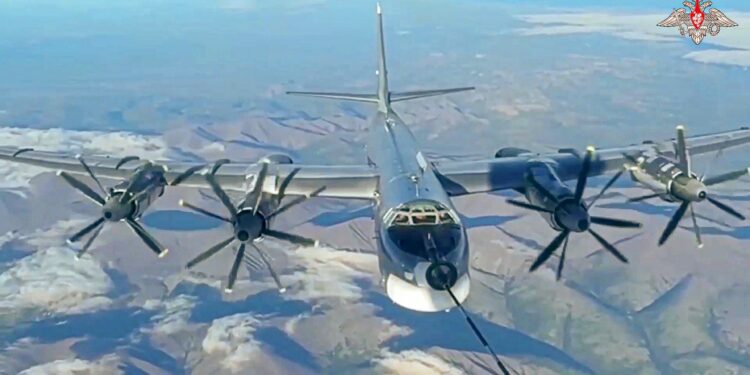First, it was a Communist Chinese spy balloon, then a Russian nuclear submarine prowling off Key West. Now it’s Chinese and Russian bombers in Alaskan airspace. America’s global rivals are not only aligning more closely with one another, but they are testing us. It’s a moment that requires a steady hand at the tiller. Yet the commander-in-chief just conceded he lacks the energy to run for re-election, and Capitol Hill frets over his fitness to hold office.
The Alaskan incursion is newsworthy, our Donald Kirk reports, in part because it’s the first time that “Chinese planes have flown in tandem in the area with the Russians.” That marks an escalation, even if it’s “not quite the same as flying within the 12-mile limit of American territorial waters,” Mr. Kirk notes. Aircraft “are asked to report where they are and what they’re doing when flying inside the 150-mile limit” of the Air Defense Identification Zone off Alaska.
While Moscow’s air force has in the past breached the zone, the joint exercise with Beijing raises concerns about the warming ties — and, perhaps, growing strategic alignment — between the two powers. The Russian and Chinese planes were today intercepted, Mr. Kirk reports, by Canadian and American warplanes. It’s a reminder that both Russia and China are eyeing an expanded sphere of influence in the Arctic, Mr. Kirk adds.
The renewed interest in the Arctic, our James Brooke reports, is shining an unflattering spotlight on America’s neighbor to the north, Canada, which is among the laggards, when it comes to defense spending, of the North Atlantic Treaty. While members of the pact agreed ten years ago to boost their military expenditures to at least 2 percent of gross domestic product, Canada has yet to reach that threshold, and appears to be in no rush to do so.
“We, Canadians, have a national health system,” is how Mr. Brooke explains the view from Ottawa. “You, Americans, have an army.” If Canada is “North America’s key to defending the Arctic,” as Mr. Brooke observes, this stance could begin to put America in danger. After all, “Russia claims its continental shelf extends to the North Pole,” he writes, and China, “a self-declared ‘near-Arctic’ country, wants to create a ‘Polar Silk Road’ through the Bering Strait.”
Just Monday, the Pentagon warned that China and Russia “are collaborating in the Arctic across multiple instruments of national power.” The joint Russian-Chinese intrusion into America’s air defense zone is timely evidence that Beijing, as the Pentagon puts it, “is attempting to leverage changing dynamics in the Arctic to pursue greater influence and access, take advantage of Arctic resources, and play a larger role in regional governance.”
One might think, then, that the joint flight today called for a stronger response than the words from the deputy defense secretary, Kathleen Hicks. She called the activity “very noticeable and concerning” at a time when China is trying to “to promote the Arctic region” as a kind of “global commons.” Another official says Americans have to keep a “watchful eye” on Moscow and Beijing. President Monroe must be rolling over in his grave.
It calls to mind the tactic, often attributed to Lenin, but popularized by President Nixon, who was no stranger to Soviet methods: “Probe with bayonets. If you encounter mush, proceed; if you encounter steel, withdraw.” So far, the response by President Biden to the probes by both Russia and Red China have been mild. That seems unlikely to change in Mr. Biden’s lame-duck tenure. The coming election offers a chance for a course reset.
Source link : http://www.bing.com/news/apiclick.aspx?ref=FexRss&aid=&tid=66b176e32cec45d4b297001bfa555d77&url=https%3A%2F%2Fwww.nysun.com%2Farticle%2Fa-russo-chinese-incursion-over-alaska&c=7824869482106692676&mkt=en-us
Author :
Publish date : 2024-07-25 10:25:00
Copyright for syndicated content belongs to the linked Source.







